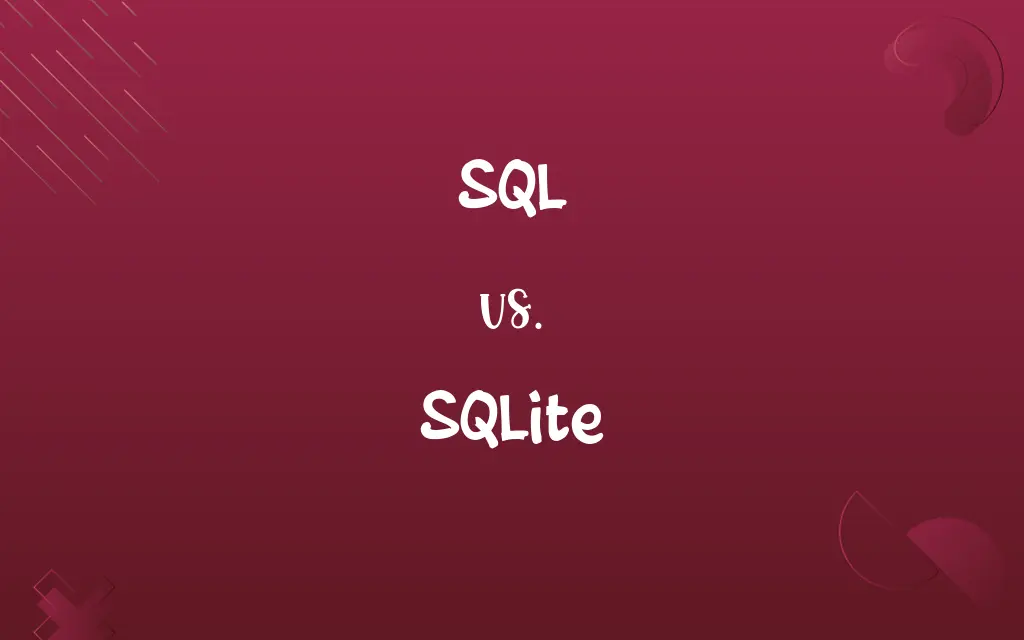SQL vs. SQLite: Know the Difference

By Shumaila Saeed || Published on February 2, 2024
SQL is a standardized language for managing and querying databases, while SQLite is a self-contained, file-based database management system using SQL syntax.

Key Differences
SQL, or Structured Query Language, is a standard language used for accessing, manipulating, and querying databases. It is widely used across various database management systems (DBMS). SQLite, on the other hand, is a specific DBMS that uses SQL as its query language. Unlike many other DBMSs, SQLite is lightweight and stores the entire database as a single file on the device.
Shumaila Saeed
Feb 02, 2024
SQL is designed to work with databases in a client-server model where the database is hosted on a server and accessed by multiple clients. It is not a database itself but a language for interacting with databases. SQLite, in contrast, is designed for a zero-configuration, serverless architecture, where the database engine is integrated into the application. This makes SQLite highly portable and efficient for applications with local storage needs.
Shumaila Saeed
Feb 02, 2024
When it comes to complexity and scalability, SQL as a language can handle complex queries and large-scale databases efficiently, making it suitable for enterprise-level applications. SQLite is more suited for simpler, smaller-scale applications such as embedded systems or mobile applications, where a full-scale SQL server implementation would be unnecessary and resource-intensive.
Shumaila Saeed
Feb 02, 2024
In terms of data types and features, SQL offers a wide range of functions, data types, and capabilities, which vary slightly depending on the DBMS implementation. SQLite supports most of the standard SQL data types and features, but it may lack some of the advanced features found in more comprehensive SQL-based DBMS like MySQL or PostgreSQL.
Shumaila Saeed
Feb 02, 2024
From a usage perspective, SQL requires understanding of its syntax and logic to effectively communicate with a database. It is a fundamental skill for database administrators and developers. SQLite, while utilizing SQL syntax, offers a simpler and more streamlined experience, making it accessible for developers who require a lightweight database solution without the need for complex database administration.
Shumaila Saeed
Feb 02, 2024
ADVERTISEMENT
Comparison Chart
Complexity and Scalability
High, for large-scale databases
Lower, for smaller-scale projects
Shumaila Saeed
Feb 02, 2024
Data Types and Features
Extensive, varies by DBMS
Standard, with some limitations
Shumaila Saeed
Feb 02, 2024
Ideal Use Case
Enterprise-level applications
Mobile applications, small projects
Shumaila Saeed
Feb 02, 2024
ADVERTISEMENT
SQL and SQLite Definitions
SQL
SQL allows the creation, modification, and deletion of database structures and data.
SQL was used to update the prices in the product table.
Shumaila Saeed
Jan 17, 2024
SQLite
SQLite is embedded into the end program, requiring no separate server.
Our mobile app uses SQLite for its compact, embedded database.
Shumaila Saeed
Jan 17, 2024
SQL
SQL supports data definition and schema creation in databases.
Using SQL, we defined a new table for our sales data.
Shumaila Saeed
Jan 17, 2024
SQLite
SQLite supports most of SQL's standard query language features.
We implemented the search feature using SQLite's SQL compatibility.
Shumaila Saeed
Jan 17, 2024
SQL
SQL enables data filtering and sorting in database queries.
SQL sorted the results by date for the monthly summary.
Shumaila Saeed
Jan 17, 2024
ADVERTISEMENT
SQLite
SQLite is a self-contained, serverless database engine.
SQLite stores our app's data without needing a separate server.
Shumaila Saeed
Jan 17, 2024
SQL
SQL provides commands for data insertion, querying, updating, and deletion.
The report was generated using a complex SQL query.
Shumaila Saeed
Jan 17, 2024
SQLite
SQLite is known for its lightweight and file-based approach to data management.
SQLite's file-based system simplifies our data backup process.
Shumaila Saeed
Jan 17, 2024
SQL
SQL is a language for managing and querying relational databases.
We use SQL to retrieve customer data from our database.
Shumaila Saeed
Jan 17, 2024
SQLite
SQLite is ideal for applications with localized, less complex database needs.
SQLite efficiently manages the database for our standalone software.
Shumaila Saeed
Jan 17, 2024
Repeatedly Asked Queries
Is SQLite suitable for large-scale applications?
SQLite is better suited for smaller-scale applications due to its simpler and lighter design.
Shumaila Saeed
Feb 02, 2024
What makes SQLite popular for mobile applications?
SQLite’s lightweight and self-contained nature makes it ideal for mobile applications.
Shumaila Saeed
Feb 02, 2024
Can SQLite handle complex queries like SQL?
SQLite can handle most standard SQL queries but may lack some advanced features.
Shumaila Saeed
Feb 02, 2024
How does SQL differ from SQLite?
SQL is a language, while SQLite is a database system that implements SQL.
Shumaila Saeed
Feb 02, 2024
Does SQL require a server?
SQL itself doesn’t, but it is generally used in client-server database environments.
Shumaila Saeed
Feb 02, 2024
Does SQL support transactional operations?
Yes, SQL supports transactions, but implementation can vary with the database system.
Shumaila Saeed
Feb 02, 2024
What is SQL?
SQL is a standard language for managing and querying relational databases.
Shumaila Saeed
Feb 02, 2024
What is SQLite?
SQLite is a lightweight, self-contained database management system that uses SQL.
Shumaila Saeed
Feb 02, 2024
Can SQL be used with different database systems?
Yes, SQL is used across various database management systems.
Shumaila Saeed
Feb 02, 2024
Can SQLite work offline?
Yes, SQLite is designed to work well in offline environments.
Shumaila Saeed
Feb 02, 2024
How does SQLite store data?
SQLite stores data in a single, file-based format on the local device.
Shumaila Saeed
Feb 02, 2024
Is learning SQL necessary for using SQLite?
A basic understanding of SQL is helpful for using SQLite effectively.
Shumaila Saeed
Feb 02, 2024
Can SQL interact with multiple databases simultaneously?
Yes, SQL can be used to interact with multiple databases, depending on the DBMS capabilities.
Shumaila Saeed
Feb 02, 2024
What are the typical use cases for SQL?
SQL is used in data manipulation, querying, and database management in various applications.
Shumaila Saeed
Feb 02, 2024
Is SQL the same in all database systems?
The core of SQL is consistent, but there can be variations and extensions in different systems.
Shumaila Saeed
Feb 02, 2024
What programming languages can be used with SQLite?
SQLite can be used with numerous programming languages, including Python, C, Java, and more.
Shumaila Saeed
Feb 02, 2024
Can SQL alone create a functional database?
SQL is used to structure and manage data in a database, but it requires a DBMS like SQLite to function.
Shumaila Saeed
Feb 02, 2024
What are the limitations of SQLite?
SQLite is less suited for high concurrency or write-intensive operations.
Shumaila Saeed
Feb 02, 2024
How secure is SQLite?
SQLite is secure for local storage but lacks built-in network-level security features.
Shumaila Saeed
Feb 02, 2024
Share this page
Link for your blog / website
HTML
Link to share via messenger
About Author
Written by
Shumaila SaeedShumaila Saeed, an expert content creator with 6 years of experience, specializes in distilling complex topics into easily digestible comparisons, shining a light on the nuances that both inform and educate readers with clarity and accuracy.









































































